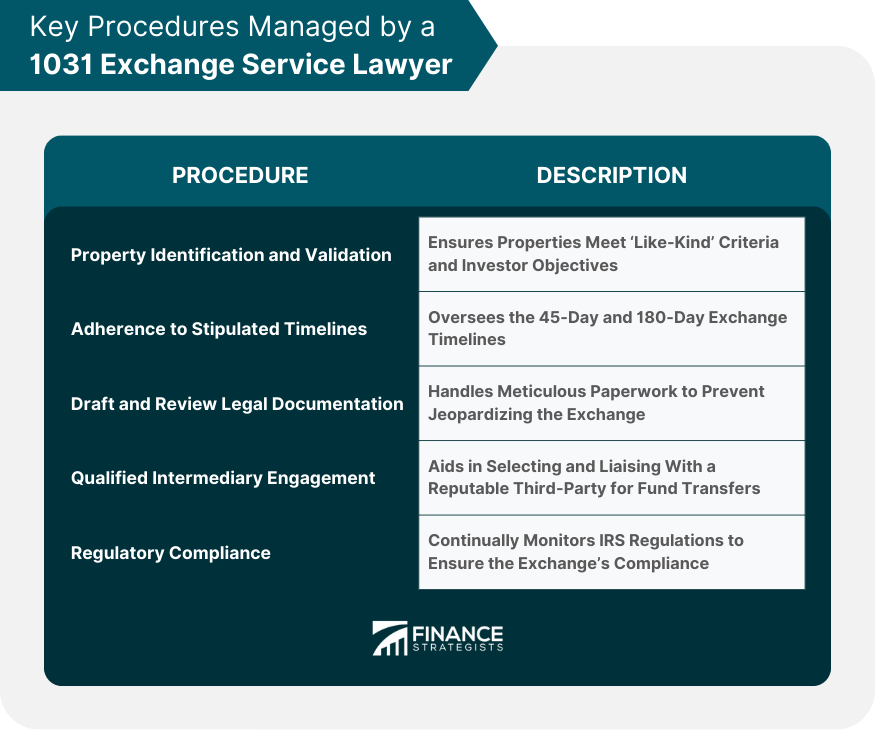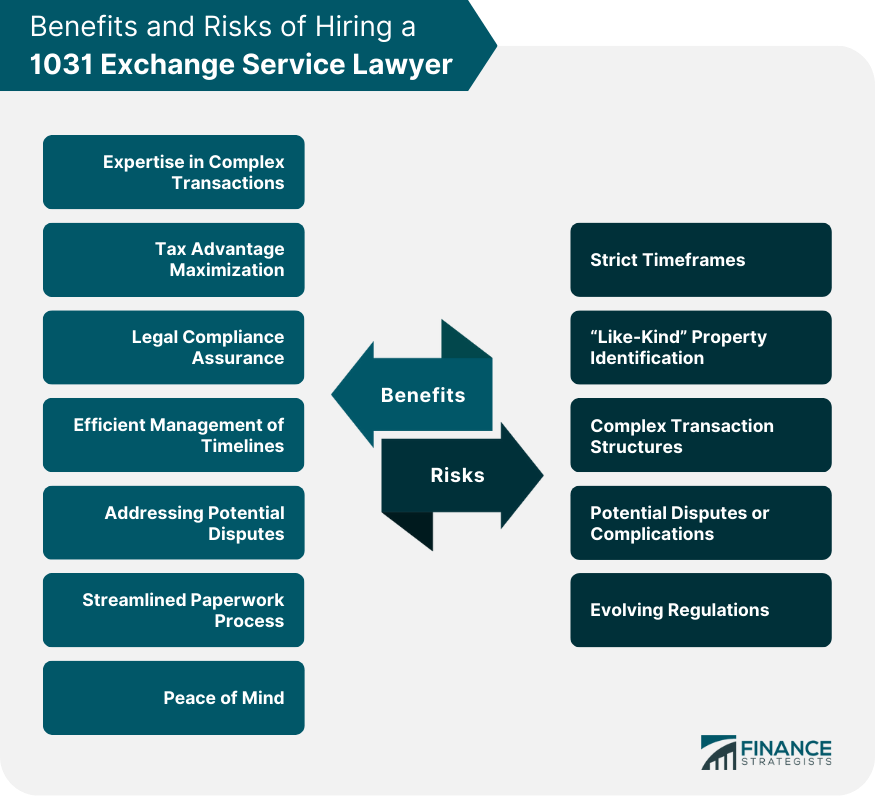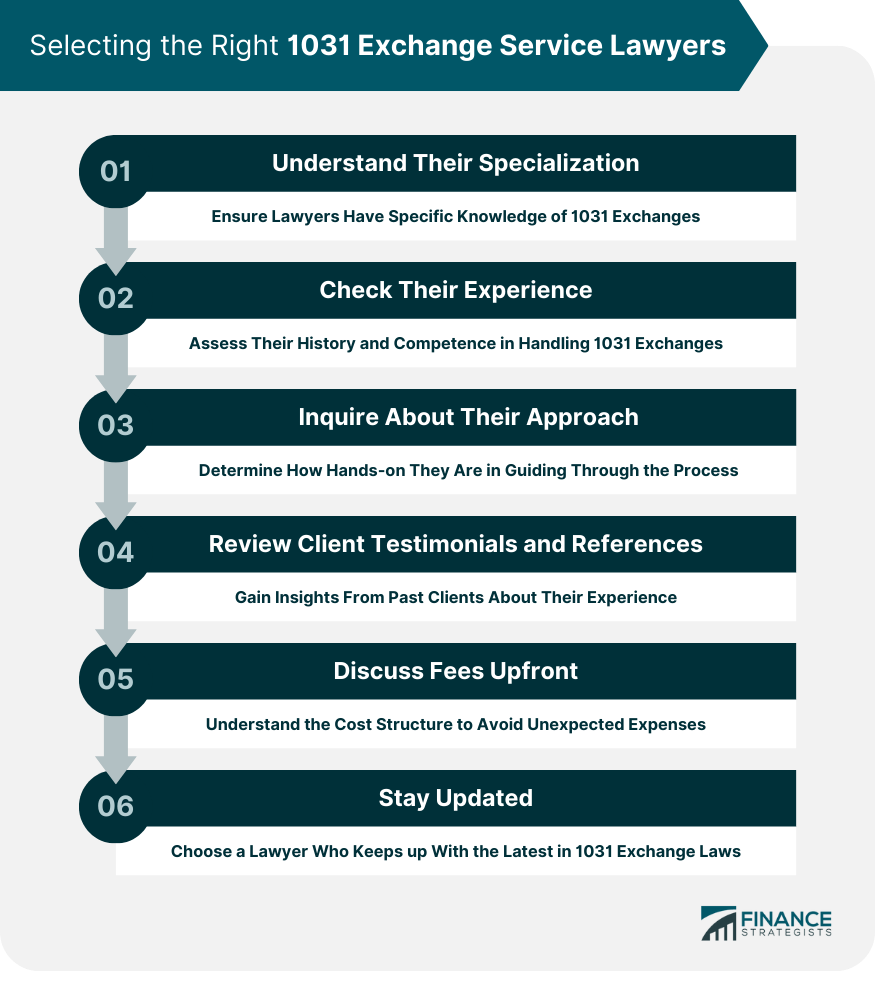A 1031 Exchange Service Lawyer is a legal professional who specializes in the intricacies of the 1031 exchange process, as outlined in the U.S. Internal Revenue Code. This process allows investors to swap one business or investment property for another, deferring capital gains taxes. Given the complexity and strict rules involved, these lawyers ensure compliance with regulations, guide investors through tight timelines, and help in the identification of qualifying 'like-kind' properties. By leveraging their expertise, they provide peace of mind to investors, ensuring a smooth and tax-efficient property exchange. In essence, a 1031 Exchange Service Lawyer is an indispensable ally for anyone considering a property exchange to maximize financial benefits while navigating legal intricacies. The most critical phase of a 1031 exchange is identifying potential replacement properties. After the sale of the relinquished property, an investor has a mere 45 days to formally identify potential replacement assets. The 1031 Exchange Service Lawyer assists in this process, ensuring the properties listed not only meet the 'like-kind' criteria but also align with the investor's objectives. Beyond the 45-day identification window, there's an additional overarching timeline: the investor must complete the acquisition of the replacement property within 180 days of the sale of the original asset. Ensuring strict adherence to these timelines is paramount, as deviations can invalidate the entire exchange and lead to significant tax liabilities. The lawyer vigilantly oversees this calendar, offering reminders and guidance to keep the transaction on track. A successful 1031 exchange hinges on meticulous paperwork. From the exchange agreement, and assignment agreements, to notices of assignment, each document must be flawlessly drafted and executed. The 1031 Exchange Service Lawyer is responsible for preparing these papers, ensuring their accuracy, and facilitating their timely execution, reducing the risk of clerical errors that could jeopardize the exchange. For a 1031 exchange to be valid, the proceeds from the sold property must not touch the hands of the seller until the purchase of the replacement property. This mandates the involvement of a third party, known as the Qualified Intermediary (QI). The lawyer assists in selecting a reputable QI, liaising with them, and ensuring that the exchange funds are appropriately held and transferred. Tax codes and real estate regulations are notoriously intricate and subject to change. The 1031 Exchange Service Lawyer continually stays abreast of any alterations to the IRS regulations pertaining to 1031 exchanges. Their expertise guarantees that an investor's exchange remains compliant, shielding them from potential legal pitfalls. A 1031 exchange involves swapping one investment property for another to defer capital gains taxes. The process, governed by specific rules and conditions, is often too intricate for the average investor. A seasoned lawyer ensures the transaction adheres to all regulations, reducing the risk of errors that could prove costly. One of the primary motivations behind a 1031 exchange is the deferral of capital gains tax. A specialized lawyer can guide investors on how to optimize this tax benefit, ensuring maximum financial advantage. The rules for a 1031 exchange are stringent and ever-evolving. Failing to adhere can result in hefty penalties and missed tax deferment opportunities. By hiring a lawyer, investors ensure that the transaction aligns with current federal regulations. Two critical deadlines dictate the 1031 exchange process: a 45-day window to identify potential replacement properties and a total of 180 days to finalize the acquisition. With a lawyer's guidance, these timelines are more effectively managed, ensuring no crucial dates are missed. Should any disputes arise during the transaction process, having a 1031 Exchange Service Lawyer on your side ensures you have expert representation. They can address complications, mediate discussions, and help steer the process back on track. Legal documentation is a significant aspect of property transactions. A 1031 Exchange Service Lawyer takes the lead in drafting, reviewing, and ensuring all paperwork is legally accurate and comprehensive. Beyond the tangible benefits, there’s an intangible yet invaluable advantage—peace of mind. Knowing that an experienced legal professional is overseeing the process allows investors to focus on other aspects of their investments, assured that their 1031 exchange is in competent hands. One of the most daunting challenges is the stringent timeline. After selling a property, investors have precisely 45 days to identify potential replacement properties and a total of 180 days to close on the purchase. Even by a single day, missing these deadlines can invalidate the entire exchange. Not all properties qualify for a 1031 exchange. The term 'like-kind' might seem broad, but it has specific interpretations in the tax code. Beyond standard exchanges, there are more complex variations, such as reverse or construction exchanges. These involve additional steps and potential pitfalls. There's always a risk of disputes arising, be it with the buyer, seller, or intermediary. These could revolve around property value disagreements, damage claims, or other issues. Tax laws are notorious for their frequent changes and updates. What was valid a year ago might not be applicable today. Not all real estate lawyers are well-versed in the specificities of 1031 exchanges. It's imperative to choose a lawyer with a focus on, or significant experience in, 1031 exchanges. Their deep-rooted understanding of the process can be the difference between a smooth transaction and a missed opportunity. In legal matters, experience often translates to expertise. Ask potential lawyers about their history with 1031 exchanges: How many have they overseen? Were there any complications? If so, how were they resolved? An experienced lawyer will not only be familiar with the process but will also be adept at navigating unexpected challenges. Every lawyer has a unique approach to handling transactions. Some might be very hands-on, guiding you through every step, while others might only step in at key junctures. Ensure the lawyer's style aligns with your expectations and comfort level. Past clients can offer invaluable insights. Look for reviews or ask the lawyer directly for references. This can give you a clearer picture of their professionalism, responsiveness, and the quality of their services. Legal services can be costly, and it's essential to have a transparent conversation about fees at the outset. Whether they charge a flat fee or an hourly rate, understanding the cost structure will help in avoiding surprises down the line. 1031 exchanges, like many areas of tax law, are subject to change. A good 1031 Exchange Service Lawyer will continuously update their knowledge. It's beneficial to choose someone who's proactive about staying current with evolving regulations and trends. • Hourly Rates: Some lawyers charge based on the time they spend on a client's case. This can range widely depending on the lawyer's experience, location, and reputation. While this offers a pay-for-what-you-use model, it can also lead to unpredictable final costs, especially if complications arise. • Flat Fees: Many 1031 Exchange Service Lawyers charge a flat fee for their services. This can be beneficial for clients as they know upfront what the cost will be, regardless of how many hours the lawyer ends up dedicating to their exchange. • Retainer Model: In some cases, lawyers might require an upfront retainer fee, which acts as a pre-payment. As they work on the exchange, they'll deduct their fees from this amount. This often assures the lawyer of payment and gives the client a reserve of dedicated legal time. Complexity of the Exchange: A straightforward exchange might not require as much time or resources as one involving multiple properties or a reverse exchange. Thus, more intricate scenarios can command higher fees. Geographical Differences: Lawyers in major cities or high-demand areas might charge more than those in smaller towns or regions with less demand for 1031 exchanges. Experience and Specialization: A lawyer who is a recognized expert in 1031 exchanges, with a track record of successful transactions, is likely to charge more than someone who is newer to the field. Ancillary Costs: Apart from the lawyer's fees, there might be additional expenses such as court fees, costs related to property validation, and other administrative fees. While there is an obvious cost associated with hiring a 1031 Exchange Service Lawyer, the potential benefits should also be weighed. A successful exchange can defer significant capital gains taxes, and having expert guidance ensures that the process remains compliant with regulations, reducing potential risks. Furthermore, considering the potential pitfalls and missteps that can occur, investing in a lawyer's expertise can save investors money in the long run. A 1031 Exchange Service Lawyer plays an indispensable role in guiding investors through the nuanced realm of property exchanges under the U.S. Internal Revenue Code. These legal experts not only ensure compliance with evolving regulations but also help navigate the strict timelines, complex documentation, and potential disputes inherent in the process. Their specialization offers a safeguard against costly missteps and guarantees the maximization of tax advantages. With costs varying based on factors like complexity, location, and experience, it's essential to transparently discuss fees and consider the long-term financial benefits these professionals bring. For anyone seeking to capitalize on the 1031 exchange opportunity, the expertise of such a lawyer proves invaluable, providing both tangible advantages and the peace of mind that every aspect of the exchange is expertly managed.What Is a 1031 Exchange Service Lawyer?
Key Procedures Managed by a 1031 Exchange Service Lawyer
Property Identification and Validation
Adherence to Stipulated Timelines
Draft and Review Legal Documentation
Qualified Intermediary Engagement
Regulatory Compliance

Benefits of Hiring a 1031 Exchange Service Lawyer
Expertise in Complex Transactions
Tax Advantage Maximization
Legal Compliance Assurance
Efficient Management of Timelines
Addressing Potential Disputes
Streamlined Paperwork Process
Peace of Mind
Common Risks in 1031 Exchanges and the Lawyer's Role
Strict Timeframes
“Like-Kind” Property Identification
Complex Transaction Structures
Potential Disputes or Complications
Evolving Regulations

Criteria for Choosing 1031 Exchange Service Lawyers
Understand Their Specialization
Check Their Experience
Inquire About Their Approach
Review Client Testimonials and References
Discuss Fees Upfront
Stay Updated

Costs and Fees Associated With a 1031 Exchange Service Lawyer
Typical Fee Structures
Factors Influencing the Costs
Weighing the Benefits Against the Investment
Conclusion
1031 Exchange Service Lawyer FAQs
A 1031 Exchange Service Lawyer specializes in guiding investors through the process of 'like-kind' property exchanges under Section 1031 of the U.S. Internal Revenue Code, ensuring compliance with all legal requirements and maximizing tax advantages.
By leveraging their expertise and experience, a 1031 Exchange Service Lawyer ensures adherence to critical timelines, validates the 'like-kind' nature of properties, and helps navigate complex scenarios, thereby preventing potential legal and financial missteps.
When hiring a 1031 Exchange Service Lawyer, it's crucial to consider their experience in handling similar transactions, relevant certifications, and their approach to potential complications. Past client reviews and testimonials can also be informative.
While hiring a 1031 Exchange Service Lawyer involves an investment, the benefits, including tax savings, legal protection, and streamlined transactions, often outweigh the costs, making it a prudent decision for many investors.
Professional 1031 Exchange Service Lawyer continuously educates themselves through legal seminars, workshops, and industry publications, ensuring they are well-versed with the latest regulations, rulings, and emerging trends in the 1031 exchange domain.
True Tamplin is a published author, public speaker, CEO of UpDigital, and founder of Finance Strategists.
True is a Certified Educator in Personal Finance (CEPF®), author of The Handy Financial Ratios Guide, a member of the Society for Advancing Business Editing and Writing, contributes to his financial education site, Finance Strategists, and has spoken to various financial communities such as the CFA Institute, as well as university students like his Alma mater, Biola University, where he received a bachelor of science in business and data analytics.
To learn more about True, visit his personal website or view his author profiles on Amazon, Nasdaq and Forbes.











